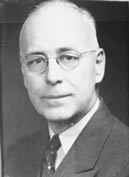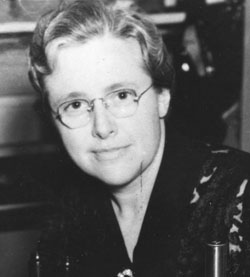
|
Adding
luster to DePauw's reputation in the sciences were two outstanding
teacher-scholars, Truman G. Yuncker and Winona H. Welch. Yuncker,
a native of Carson City, Mich., who received his B.S. from Michigan
State and A.M. at the University of Nebraska, taught briefly at
Manual High School in Indianapolis before serving with the Army
Medical Corps in World War 1. After obtaining his Ph.D. from the
University of Illinois he joined the DePauw faculty in 1919 and
served as head of the botany and bacteriology department from its
establishment in the 1920s until his retirement in 1956. During
his long tenure at DePauw, Yuncker pursued his study of plant life
in Europe, Central and South America, and such exotic places as
the Tonga Islands in the South Pacific, often taking along student
assistants from his college classes. He became the world's leading
authority on the herb Piperaceae and published his monumental work,
The Piperaceae of Northern South America, in 1950. The only DePauw faculty member to this date to receive a Guggenheim
fellowship, Yuncker was widely recognized for his scientific work.
He served as president of both the Indiana Academy of Science and
the American Society of Plant Taxonomists, and vice president and
treasurer of the Botanical Society of America, which named him one
of the country's outstanding botanical scientists in 1962. He died
in Greencastle in 1964, survived by his wife Ethel and two daughters,
Betty Jane Lee '42 and Barbara Yuncker '43.
Professor Welch followed Yuncker as head of the botany and bacteriology
department in 1956, becoming the first woman to hold such a position
in the sciences at DePauw. She also was the first woman to be elected
president of the Indiana Academy of Science and to chair the Central
States Section of the Botanical Society of America. Active in Phi
Beta Kappa and such organizations as the American Association of
University Women, Daughters of the American Revolution, and the
national sorority PEO, she was given a special citation by the General
Federation of Women's Clubs. She continued to teach part-time after
retirement and served as curator of the Truman G. Yuncker Herbarium
to which she and her mentor had contributed so many specimens. |
Depauw University e-history | E-mail comments to: archives@depauw.edu



 __________________________
__________________________